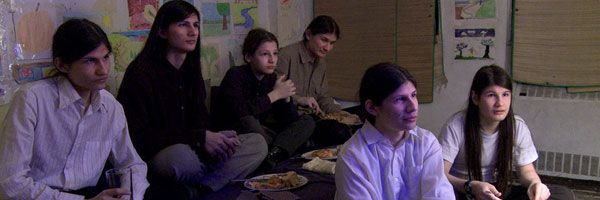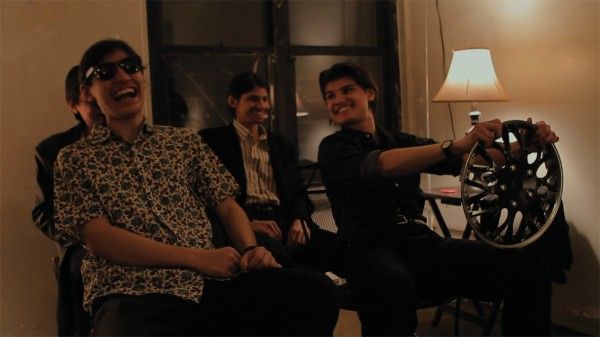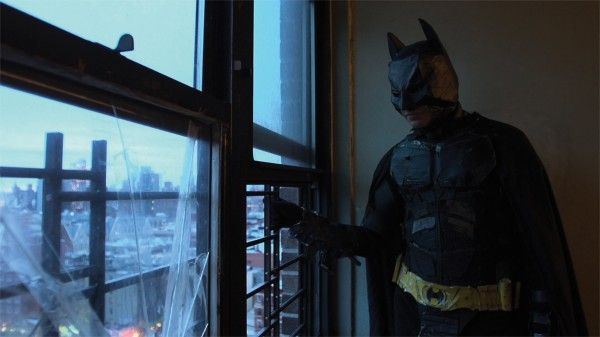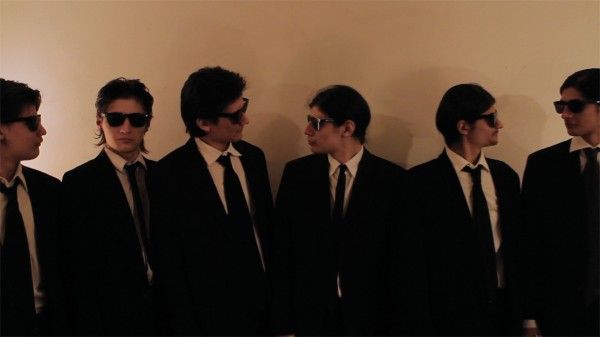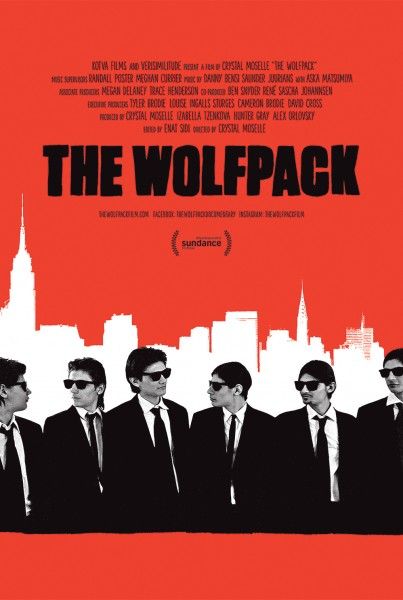Everyone wants to make sure their kids turn out alright. It’s instinct as parents to try and protect your children from harm, and to ensure that they’re going to turn into decent people when they grow up. But how far is too far? Director Crystal Moselle’s incredible documentary The Wolfpack chronicles the story of six brothers who spent their entire lives locked away from society in a small New York City apartment, with movies serving as their only connection to the outside world. The film is a poignant, fascinating, and sad story of what it means to live life and how movies shape our view of the world.
The Angulo family is made up of six brothers and one mentally challenged sister. From birth, they’ve been kept inside the confines of a small apartment in the projects of the Lower East Side. Their father, Oscar, wanted to keep them away from “social pressures” and so he opted to limit their exposure to the outside world, leaving their unassuming, Midwestern former hippie mother Susanne to homeschool them. Their father kept the only keys to the front door, and the number of times they would step outside would range from between 9 and only 4 or 5 from year to year—one year they didn’t go outside at all.
Since the Angulo brothers had no contact without anyone outside their family, they became enamored of movies. Not only would they watch films over and over again, they also took to reenacting them word-for-word, as one of the brothers would watch the movie with the subtitles on and transcribe his own screenplay. They would dress up in elaborate costumes, create prop guns, and then act out the entirety of films like Reservoir Dogs or Pulp Fiction. Their reenactments are displayed in the documentary, and maybe not so surprisingly, most of them are really good actors who take getting into character seriously.
The brothers speak quite well, thanks not only to the quantity but variety of films they watch. They have an equal adoration for The Lord of the Rings, Gone with the Wind, and Manhunter, and they speak to each other in movie quotes or references very frequently. This is how they connect with each other, interact with each other, and try to forget the fact that they’re essentially living in a prison.
From the interviews, it’s clear that the brothers harbor resentment towards their father, whose decision not to work is self-described as a “rebellion” against the government. The family subsides on the money Susanne receives for homeschooling, which isn’t much. The boys speak of frequent time when Oscar would hit Susanne, and even Susanne breaks every once in a while and talks poorly of her husband. During one interview, she says she understands the boys’ desire to go outside and live freely, adding that she “had even more rules than they did.” She claims that she is always “stuck in the middle.” There’s a bit of a Stockholm Syndrome taking place in which no one is really willing to stand up to Oscar, who tells Moselle that his power is “influencing everybody,” and he seems to hold little concern for whether his children forgive him or not.
But everything starts to change when Mukunda, the third oldest brother, breaks out of the apartment one day and wanders around New York City wearing a Michael Myers mask (he says the mask was an effort to not be noticed). He’s picked up by police and sent to spend time in a hospital, which provides him with his very first social interactions with people outside his family. Mukunda returns home, but he is now a changed man who’s seen the outside world for himself.
Slowly, the other brothers begin to venture outside the apartment as well, but they find that what they thought they knew about the world from watching films doesn’t necessarily translate to reality. For example, Mukunda says he learned some new words on the outside like “cool” and “like”, the latter of which he discovers is used as every other word in a sentence by some people. These are pieces of social verbiage that don’t make their way into many screenplays, and it provides a fascinating point of delineation between how different reality and the world of movies really is.
Moselle wisely doesn’t push any of the brothers to emotional breaking points, instead letting them get comfortable revealing themselves on their own terms. While the boys are clearly happy taking part in their recreations of films or putting on a Halloween show, the individual interviews reveal a pain and sense of loss underneath the surface. Not only does the film consider how relying on films to relate to other people translates in the real world, but it shows the deep-rooted consequences of trying to carefully control or micromanage your child’s lives.
While the Angulo brothers’ reliance on films may have made their first social interactions with the world incredibly awkward and tinged with paranoia, movies were also their saving grace. One brother says watching movies “makes me feel like living”, adding “If I didn’t have movies, life would be boring; there would be no point to go on.” Without the world of film, these boys may have ended up much more emotionally damaged by this experience. They offered them a way of escape, if only for a fleeting moment, and their impact on the boys’ development was profound.
The Wolfpack is simultaneously fascinating and infuriating. That someone would willingly treat their children this way is maddening, and Oscar’s reluctance to show any kind of remorse makes it all the more difficult to watch. But the film is also inspiring. These boys, faced with an impossible situation, found life in one of the things we take for granted: film. It offered them a window with which to connect to the world, and while their social abilities may have been hindered by the process, movies gave them happiness where there was little to be found, and that’s something that’s invaluable. But movies alone aren't wholly fulfilling, and relying on them for one's sole connection to humanity is, as evidenced by the film, unhealthy.
The Wolfpack not only speaks to the specific story of the Angulo brothers, but also to living life in general. Using entertainment as a conduit through which to connect is ultimately unfulfilling. You have to go outside and be in the world to truly relate, and while parents sometimes feel like they're protecting their kids by sheltering them, they’re actually preventing them from experiencing all that life has to offer. As Susanne points out in the film, something bad might happen by taking a risk, but something good could also come as a result. You can’t know until you take that leap of faith.
Rating: B+
Click here for all of our Sundance 2015 coverage. Click on the links below for our other reviews:
Matt’s Reviews:
- The Bronze
- The End of the Tour
- In Football We Trust
- The Mask You Live In
- Most Likely to Succeed
- Slow West
- Stockholm, Pennsylvania
- White God
- Z for Zachariah
Adam’s Reviews
- The Witch
- I Am Michael
- Kurt Cobain: Montage of Heck
- Ten Thousand Saints
- Sleeping with Other People
- Mistress America
- Last Days in the Desert

